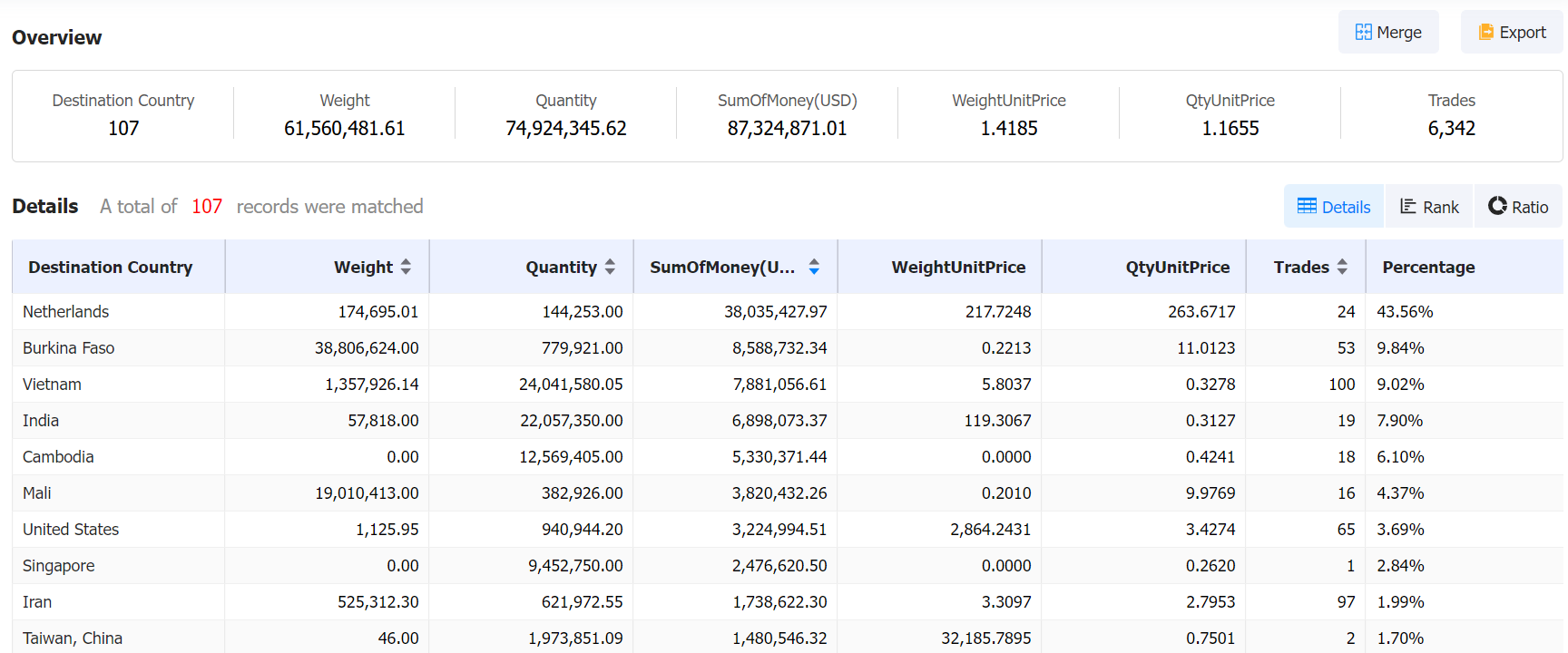 Export News
Export News
 08-04-2024
08-04-2024
Brazil's export sector remains vital to its economic growth, contributing
substantially to the country's GDP and employment. As we navigate through the
first quarter of 2024, understanding Brazil's export destinations and trade
dynamics becomes increasingly crucial for businesses seeking to capitalize on
emerging opportunities and navigate challenges effectively.

Trade Data from Tendata
1. Netherlands: A Leading Partner in Brazil's Export Landscape
The Netherlands emerges as a dominant destination for Brazil's exports in 2024 Q1, accounting for 43.56% of total exports valued at $38.04 million. This substantial trade relationship underscores the strong economic ties between the two nations. The Netherlands serves as a gateway to the European market for Brazilian products, offering favorable trade conditions and robust infrastructure. Leveraging this partnership, Brazilian exporters can access a wide consumer base and diversify their export portfolio.
2. Burkina Faso: Exploring Trade Potential in West Africa
With a share of 9.84% amounting to $8.59 million, Burkina Faso emerges as a noteworthy destination for Brazil's exports in the first quarter of 2024. This West African nation presents untapped opportunities for Brazilian exporters, particularly in sectors such as agriculture, machinery, and textiles. By establishing strategic partnerships and understanding local market dynamics, Brazilian businesses can capitalize on Burkina Faso's growing demand for quality goods and services.
3. Vietnam: Tapping into the Asian Market
Vietnam holds a significant share of Brazil's exports, amounting to 9.02% with a value of $7.88 million in 2024 Q1. The strategic location of Vietnam in Southeast Asia, coupled with its rapid economic growth, makes it an attractive market for Brazilian exporters. Key sectors for collaboration include electronics, agriculture, and renewable energy. By fostering trade relations with Vietnam, Brazilian businesses can access a dynamic market and capitalize on the region's burgeoning consumer demand.
4. India: Strengthening Bilateral Trade Relations
India emerges as a prominent destination for Brazil's exports, accounting for 7.9% with a value of $6.9 million in the first quarter of 2024. The bilateral trade relations between Brazil and India continue to strengthen, driven by mutual interests in sectors such as pharmaceuticals, IT services, and agribusiness. To enhance trade collaboration, Brazilian exporters can leverage platforms such as trade fairs, business delegations, and digital marketplaces to connect with Indian buyers and explore new opportunities.
5. Cambodia: Exploring Emerging Markets in Southeast Asia
Cambodia represents a growing market for Brazil's exports, with a share of 6.1% valued at $5.33 million in 2024 Q1. The Cambodian economy has witnessed robust growth in recent years, fueled by investments in manufacturing, tourism, and infrastructure. Brazilian exporters can capitalize on this momentum by offering competitive products in sectors such as textiles, footwear, and consumer goods. By understanding Cambodia's regulatory environment and consumer preferences, Brazilian businesses can position themselves for success in this emerging market.

Analyzing Trade Trends and Market Opportunities
The first quarter of 2024 showcases Brazil's diverse export portfolio and its strategic partnerships across different regions. While traditional markets such as the Netherlands and the United States remain crucial, emerging economies in Asia and Africa present untapped opportunities for Brazilian exporters. By identifying key trends, diversifying export destinations, and leveraging digital platforms for market expansion, Brazilian businesses can enhance their competitiveness and navigate global uncertainties effectively.
Utilizing Tendata for Market Analysis and Customer Acquisition
In navigating the complex landscape of international trade, leveraging data-driven insights is essential for informed decision-making. Tendata offers a comprehensive database for analyzing export-import trends, identifying potential markets, and connecting with prospective buyers. By harnessing the power of Tendata, businesses can gain a competitive edge in their export-import operations, optimize supply chain management, and unlock new growth opportunities in the global market.
Conclusion
As Brazil continues to strengthen its position in the global export market, understanding key trade trends and market dynamics is paramount for businesses seeking sustainable growth. By exploring diverse export destinations, forging strategic partnerships, and leveraging data-driven insights, Brazilian exporters can navigate challenges and capitalize on emerging opportunities in the dynamic landscape of international trade.
Category
Leave Message for Demo Request or Questions


 T-info
T-info T-discovery
T-discovery

 My
Tendata
My
Tendata Market Analysis
Market Analysis Customer
Development
Customer
Development Competitor
Monitoring
Competitor
Monitoring Customer Relationship
Customer Relationship





































































































































